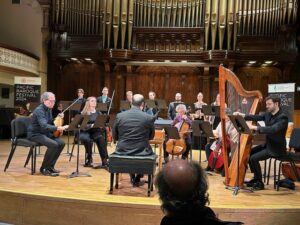I recently had the pleasure of attending three nights of the Pacific Baroque Festival. I’ll admit, my expectations were a bit high going into it—I love classical and baroque music. These expectations were not only met—they were exceeded in every way.
My first night—Wednesday, February 28—began at Christ Church Cathedral for Le Nuove Musiche 2, a program solely featuring the organ played by Edoardo Bellotti. From the moment I walked in, it was like travelling back in time. There’s something otherworldly about the gothic interior of a cathedral. From the stained glass windows to the narrow arched ceilings and impressive masonry, it was the perfect vibe for the haunting melodies we were about to hear. My friend and I took our seats amongst the pews and waited patiently for the music to start. We had no idea the journey we were about to embark on.
The moment Bellotti’s hands first graced the keys of the organ, I was hooked. He wove notes and chords together into a tangible tapestry blanketing over the entire crowd, drawing us into his magical world. He effortlessly transitioned from light and playful staccato plucks into heavy sustained hits that rumbled throughout the entire cathedral like thunder. I was completely and utterly captivated from start to finish. To say that Bellotti is a master of his craft would be an understatement. He truly brought all of the compositions to life.

Next up—on Friday, March 1—was the Sonate Concertate at the Conservatory of Music. Contrary to the other night, this program was an ensemble of six, featuring two violins, two sackbuts, a harp, a viola da gamba, and the organ and harpsichord. The program started light and joyful, with the kind of music I could imagine being played while sitting in an Italian villa with a glass of wine. As the night progressed, the music unfolded with the gentleness of a flower unfolding in spring. The atmosphere in the room was serene and relaxed.
While there are so many things I loved about this program, the highlights for me would have to be Aria di Sarabanda in varie partite, due to Antoine Malette-Chénier’s incredible harp solo, as well as Marc Destrubé and Kathryn Wiebe’s violin skills fully on display in Dario Castello’s Sonata Quarta à 2. Jeremy Berkman and Robert Fraser were a delight to watch, bringing the sackbut to life in a way I’ve never seen before. Laying the foundation for all the other instruments to build upon was Natalie Mackie on the viola da gamba and Marco Vitale playing both the harpsichord and organ. All in all, the six of them played wonderfully together and were all smiles between songs, showing just how much they enjoyed what they were doing.
I was most excited for the final night of the festival, Saturday, March 2. Dedicated to Claudio Monteverdi and his eighth book of madrigals published in 1638, this program pays homage to the feelings—passion, agitation—that Monteverdi believed were always missing from earlier compositions. Thus, the program is titled Songs of Love and War, highlighting the extreme duality of humans and our emotional intensity—the desire to conquer and kill, and the need to love and be loved.
There were a few familiar faces from the previous night making up the instrumental section. However, joining them were eight brilliant vocalists. The program began with Songs of War—an intense lineup of songs that prominently featured the bass and tenor singers. Bass singer Louis Dillon’s powerhouse of a voice filled up the room with such force I thought I was going to be knocked off my seat. And when other bass singer Jordan Rettich joined him, the two of them together were an unstoppable force of strength and tone. Now, I can’t speak about the first half of this program without paying respect to Tim Carter and his tenor solo. He sang beautifully, with such precision and attention that every note was perfectly hit.
Moving into the second half of the show, Songs of Love, the material took on a notably lighter stance, while still keeping the intense tone Monteverdi so desired. While I was happy to hear more from the alto and countertenor in this half, there’s much to be said of Jayne Hammond’s breathtaking solo. The simple instrument accompaniment of gentle harp plucks and light grazes on the violin left plenty of space for Hammond to fill. Every single person in that room was fully under her spell. Her words told the audience a story of the heartbroken yearning for a lover’s return, and her voice had us all convinced of tragedy, forcing us to feel sorrow.
As hard as it would be to follow that performance, everyone came together in the end and closed out the show in a crescendo of harmonies.
The Pacific Baroque Festival was a truly magical experience, and I’m fortunate I was able to witness such talented musicians. It was such a warm and welcoming environment with friendly staff and courteous guests. I’ll be watching the calendar for next year’s festival.
